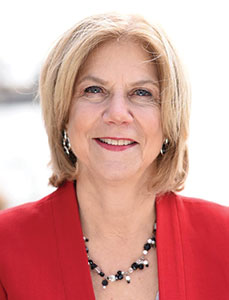Mayer, Public Advocates Go on Offensive to Battle Con Ed Rates
News Article Article pages that do not meet specifications for other Trust Project Type of Work labels and also do not fit within the general news category.

Prohibitive increases in Con Edison utility bills have prompted state Sen. Shelley Mayer (D-Yonkers) and other officials to urge their colleagues and consumers to fight back.
Mayer, joined for a webinar last Wednesday by representatives from the nonprofit Public Utility Law Project (PULP), an organization dedicated to protecting consumers and utility affordability, and Sustainable Westchester Executive Director Nina Orville, said the out-of-control hikes demand action.
“We were inundated in late January by people who were outraged and crying about their energy bills from Con Ed,” Mayer said. “One woman told me she had to live upstairs in the second floor of her house in a single room because she had to keep the downstairs cold enough in order to afford her February electric bill.”
The state Public Service Commission (PSC) stated that electricity and gas customers in New York owed nearly $1.8 billion as of January and were charged three times their normal utility rate. Utility charges were raised from six to 17 cents per kilowatt hour.
Along with Senate Majority Leader Andrea Stewart-Cousins (D-Yonkers), Mayer wrote to the PSC and Con Edison citing the swelling number of complaints from Westchester residents.
“We told them to pursue all options to suspend their rate increase and to flatten out payments,” Mayer said. “We want to reach out to all ratepayers to communicate the details of the situation and what relief is available.”
Since January, Con Edison has responded by saying rate hikes were due to the colder than usual months of December and January, which increased the demand for power.
PULP Executive Director Richard Berkley explained that New York’s deregulated energy markets show up under supply charges on a Con Ed bill.
“One is the delivery charges which is completely under the control of Con Edison,” Berkley said. “The other part of your bill is for supply charges and that’s for Con Ed’s purchase of the deregulated price of electricity and natural gas which they purchase at auction.”
He added that the cost of natural gas, which is used in New York State to generate electricity, and the cost of electricity have gone up, causing supply costs to spike.
Mayer said Con Edison was also guilty of hedging against the volatility in the price of natural gas.
“They messed up masterfully and hedged their price on what they thought it would be and they did it badly,” she charged.
Berkley and Laurie Wheelock, PULP’s deputy general counsel and deputy director, urged consumers to file a complaint with the state Department of Public Service and to demand the agency investigate Con Edison.
In 2019, the PSC approved a three-year increase for the utility and the rates have risen every year. The most recent rate increase was between 4 and 7 percent in January.
“Back-to-back you have an increase in rates from a three-year-old rate increase and then the bill surge on top of that,” Berkley said. “The PSC and Con Ed had a duty to protect you and warn you about these rate increases.”
Con Edison has proposed another 17.6 percent hike for electricity (about $1.2 billion) and a 28.1 percent increase for natural gas (about $500 million) to three million households. If approved by the PSC later this year, those rates will go into effect Jan. 1, 2023.
Berkley urged Con Edison customers to lodge a complaint against the proposed rate hike by calling 800-342-3377 or visiting www.dps.ny.gov/complaints
or https://utilityproject.org.
Wheelock said there are programs to help lower-income families apply for assistance through the Home Energy Assistance Program (HEAP), a federally-funded program/ Other programs that can help middle-income families are listed on the PULP website at https://utilityproject.org/get-help.
For those who have requested a credit on their Con Edison bill, Berkley said consumers should look at the top lefthand corner of the bill under the adjustment section. Consumers can also contact PULP for help, he said.
“The Public Service Commission usually doesn’t hear from the public or from ratepayers,” Wheeler said. “Now is the time for customers and residents to talk to them and have these conversations.”
PULP, along with other organizations, has called on Gov. Kathy Hochul to appropriate $1.25 billion in the upcoming Fiscal Year 2023 state budget for unpaid energy bills. Lawmakers are scheduled to approve a budget by Apr. 1.
Orville spoke about Sustainable Westchester’s program, Westchester Power, a community-based bulk energy purchasing effort aimed at controlling costs and increasing the use of renewable energy. The 24 municipalities in Westchester that have signed up for the program and are served by Con Edison are paying about 7.4 cents per kilowatt hour.
Upcoming public hearings on Con Edison’s request for another rate hike are scheduled for Tuesdays, Mar. 22 and 29 and Thursday, Mar. 31 at 1 and 5 p.m. Anyone wishing to view the hearing or provide a public statement, can visit www.AskPSC.com. To provide a public statement, you must pre-register by 4:30 p.m. the day before each hearing.
For additional information, visit https://www.coned.com/en/accounts-billing/your-bill/public-statement-hearings-notice.

Abby is a local journalist who has reported on breaking news for more than 20 years. She currently covers community issues in The Examiner as a full-time reporter and has written for the paper since its inception in 2007. Read more from Abby’s editor-author bio here. Read Abbys’s archived work here: https://www.theexaminernews.com/author/ab-lub2019/
